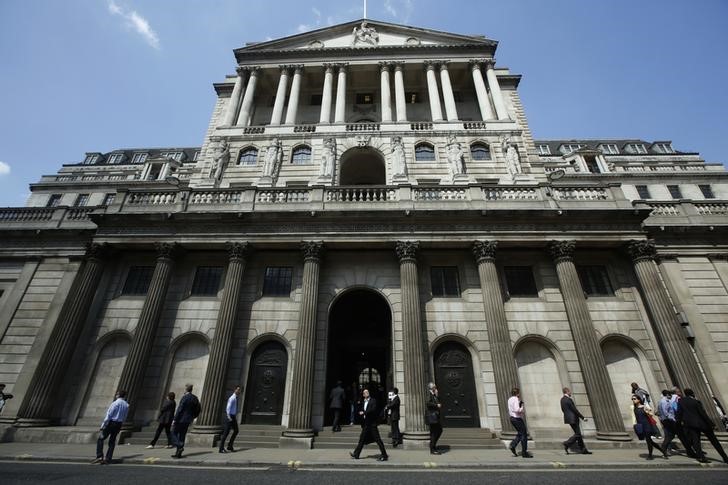LONDON (Reuters) - A Bank of England policymaker said interest rates need to rise "relatively soon" as wages pick up, adding to signs that support is gradually building for the first increase in British borrowing costs since before the financial crisis.
Martin Weale, one of the Bank's rate-setters, also said a rise would give the central bank scope to cut if the British economy runs into trouble in the future.
"With wage growth remaining firm, the tightening labour market means that inflation is likely to rise above target in two to three years' time," Weale wrote in an article for the Scotland on Sunday newspaper.
"Policy needs to be set with reference to this, rather than the current rate of inflation. As a result, it seems likely to me that the Bank Rate will need to rise relatively soon."
Britain's economy has grown strongly over the past two years and, despite recent signs of a slight slowdown, the Bank is expected to start raising rates in 2016, probably following the U.S. Federal Reserve which could move as soon as this week.
So far this year, Weale has remained part of the overwhelming majority of Monetary Policy Committee members who have voted to keep rates at their record low of 0.5 percent.
But he is seen by economists as the most likely candidate to join Ian McCafferty who was the lone proponent of a rate hike at the BoE's policy meetings in August and September.
Weale and McCafferty voted for rate hikes in late 2014, before the global oil price plunge sent British inflation heading below zero.
Weale hinted in June he might resume voting to raise rates because of rising wages but he has held his fire since then.
Another MPC member, Kristin Forbes, said on Friday interest rates would probably rise sooner rather than later.
BoE Governor Mark Carney has said the decision about whether to raise rates would become clearer around the turn of the year.
In his newspaper article, Weale said pay growth was the most important factor to watch and news of a 4 percent pay rise by supermarket chain Sainsbury's and a new, higher national minimum wage starting in April added to the sense that earnings growth was stronger than the Bank had expected earlier this year.
British workers had become a bit more productive recently, taking some of the inflationary heat out of pay growth, but it was too soon to say that was a permanent improvement.
Weale said the path of interest rates would depend on the state of the economy which remained uncertain and he would monitor carefully developments at home and abroad, taking account of possible effects of events in China where the world's second-biggest economy is slowing.
"And it is possible that, if events turn out very differently, a path of gradual rate rises might have to be reversed somewhat," Weale wrote.

"Any decision to vote to change Bank Rate will be made on the basis of the balance of risks, but with the comfort that, if subsequent developments mean that any increase needs to be reversed, that can be done."